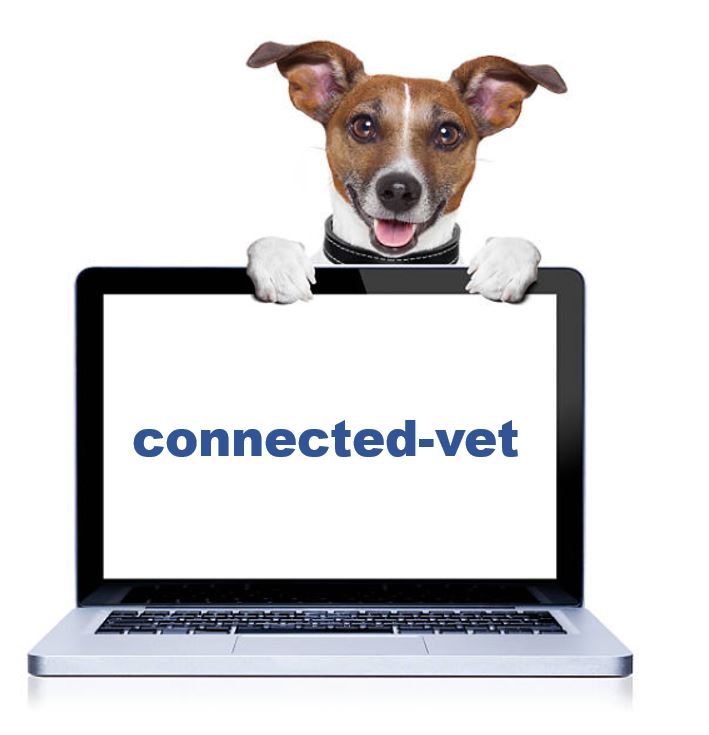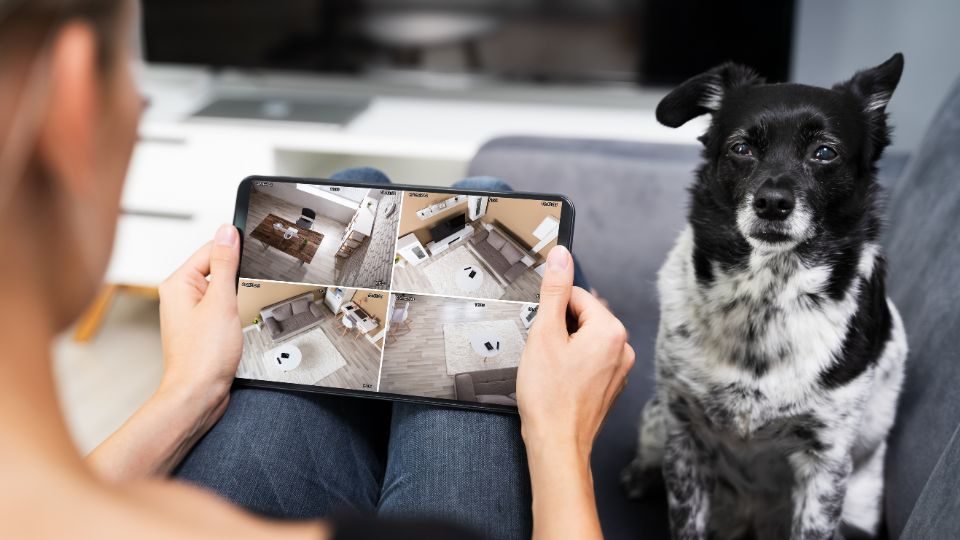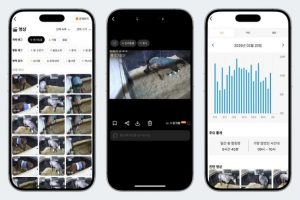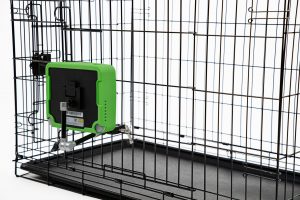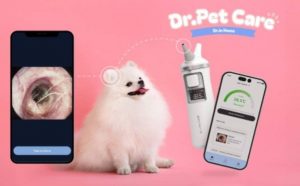South Korea has long woven a narrative of prowess in the tech domain, from smartphones and semiconductors to the seamless integration of technology into everyday life. The country is now directing its focus towards the pet care space, with global ambitions.
Government endorsement
In 2022, the estimated number of pet-owning households in South Korea reached 6 million, representing around 1 in 4 households. Underscoring the importance of this burgeoning sector, the South Korean government recently unveiled an ambitious plan to double the size of the pet care industry to 15 trillion won ($11.5B/€10.4B) by 2027. The focus will be on pet food, pet healthcare, pet services and pet tech.
“Activating the domestic market and expanding into the global market are necessary to respond to rapidly changing market factors such as pet humanization, technological innovation and demographic shifts,” Kim Hyun-woo, who leads the Companion Animal Industry & Animal Healthcare Team at the country’s Ministry of Agriculture, Food and Rural Affairs (MAFRA), tells PETS International.
At the heart of this plan is a societal shift in the perception of pets. No longer mere companions, pets are now seen as integral family members in this country, which is grappling with the world’s lowest birth rate and a rising number of one-person households.
$500 million in the next decade
In 2022, a Seoul National University analysis commissioned by MAFRA estimated the domestic pet tech sector at a modest $80.2 million (€72.6M). However, with a high annual growth rate (16.33%), this sector shows great promise, and the nation hopes that it will be worth $500 million (€453M) in 10 years’ time.
Notable pet tech players
The take-up of pet insurance in South Korea is extremely low (less than 1%), and 8 out of 10 pet owners describe veterinary medical expenses as ‘burdensome’. It is therefore perhaps unsurprising that many players in the pet tech segment are dedicated to enhancing the overall health and well-being of pets. Some of the standout companies include Petnow, Pireco and iSciLab, each providing diverse solutions in biometric recognition – a technology poised to revolutionize a potential mandatory pet registration law that is currently under discussion in the National Assembly.
Another notable player is Petner, which offers an app to access professional pet-sitting services provided exclusively by ID verified veterinary students and veterinarians, thus ensuring a high standard of care. Meanwhile, PitterPetter focuses on DNA tests for dogs and cats, offering insights into the genetic incidence of developing diseases.
Utilization of AI
One key start-up in the field is AI FOR PET. Its flagship product, TTcare, is a healthcare app that analyzes user- submitted photos of dogs or cats based on artificial intelligence (AI) to detect signs of diseases and other health issues. According to the company, the dynamic nature of the pet tech space can be attributed to the swift acceptance and utilization of new technologies that are consistently introduced and rapidly embraced in wider society. Simultaneously, challenges faced by pet parents in finding time and space for pet activities are steering a shift towards proactive pet healthcare.
“We believe that we are creating a culture of preventive medical care that has been lacking in the pet healthcare system,” says a company spokesperson. They add that the firm’s app has positively impacted users by enabling them to quickly detect health issues in the early stages. The start-up is also contributing to the evolution of pet healthcare regulations, having recently secured a 2-year special exemption from the government within the regulatory ‘sandbox’ to provide veterinary consultations online, despite this space currently being restricted by South Korean law.
Another example of how AI is being used in the context of pet health is Dogibo. This camera-based service launched by Petpeotalk allows pet owners to monitor their pets remotely. AI-supported analysis of the pet’s body language, movements, sounds and other behavior provides real-time insights into their anxiety, loneliness and overall well-being.
“Our users are grateful for knowing about their pets while they are out,” points out Ryan Kwon, CEO of Petpeotalk. “Our service highlights the problem [of pets left alone at home] and we are now looking to add functions to solve this issue, such as care services,” he continues, hinting at the possibility of becoming a comprehensive pet care service provider.
More business opportunities?
Various opportunities appear to be opening up, especially because later this year restrictions are set to be lifted on pet insurance and potentially on pet biometrics and tele-veterinary services, too. Even so, Kwon concedes that the pet care sector is still fragmented: “Pet tech, pet food, pet e-commerce, pet wearables… they’re all still a little disconnected from one another. I predict that many of these services will be acquired by large corporations and bundled into comprehensive solutions.”
Telecom giants want a slice of the pie
In a bid to secure customer loyalty, South Korea’s telecom giants are extending their roles beyond mobile phones, TV and the internet to become digital tech providers. Their services encompass everything from super-apps to music services and connected home appliances, and pet tech now falls within their comprehensive portfolio.
For example, LG Uplus, the third-largest mobile network operator in South Korea, has made a significant foray into this new market in a bid to innovate customer experience. “We are actively expanding our presence in the pet market by acquiring start ups or making equity investments that can create synergies,” says Lee Jang-ho, General Manager of the Pet Platform Squad at LG Uplus.
The firm recently acquired Along, a domestic dog space rental start-up or ‘pet Airbnb’. It also invested 3 billion won ($2.3M €2.5M) in Vetching, a provider of cloud-based electronic medical records (EMRs) for animal hospitals, and acquired PuppyU, a start-up operating South Korea’s largest online dog community. PuppyU was then integrated into LG Uplus’s Fordong pet care platform that provides ‘DBTIs’ (Myers–Briggs Type Indicator-style personality tests for dogs) and free online consultations with training experts, as well as a trainer-matching service for behavioral adjustment. Fordong has garnered more than 300,000 subscribers in just 14 months since its launch.
Meanwhile, the country’s largest mobile network operator, SK Telecom, introduced X Caliber in 2022. This AI-based veterinary x ray image diagnosis assistance service can deliver analysis within 30 seconds and detect diseases with accuracy levels of over 84%. The service recently entered Japan and the company plans to expand to the US soon. “Our vision is to apply our cutting edge AI technologies across industries and geographies to create a better world,” comments Ha Min-yong, Chief Development Officer at SK Telecom.
Ha notes concerns about a global shortage of veterinarians and radiologists. “In response to this, we envision AI playing a key role, helping veterinarians by diagnosing ailments in animals who literally cannot verbalize their symptoms,” he continues. According to him, in the future the company plans to include coverage of CT and MRI scans, and to expand the service scope to include pathological analysis such as blood tests.
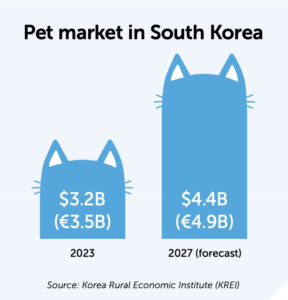
“It’s not just about the importance of pet tech; we believe this area aligns perfectly with our AI abilities and we plan to focus our cutting-edge AI skills in this sector to improve the welfare of animals,” Ha explains.
Going global
But while the domestic pet care market in South Korea is thriving, according to the latest data it represents only 1.6% of the global market. That figure falls short of the expectations of the country’s government, which wants to nurture it into a “national strategic industry”. Therefore, on top of financial support for selected start-ups, over the coming years the government is allocating more than $25 million (€22.6M) to fund research and development in initiatives where there is growing demand, such as in digital healthcare, medical devices, and pet tech items like robotic toys and wearables.
Another government solution is a comprehensive infrastructure called One-Welfare Valley for the development of the overall pet care industry. This initiative will serve as an innovation hub for demonstrations, research and entrepreneurship. “We will secure a level of quality competitiveness that will allow our companies to compete on the global stage,” concludes MAFRA’s Kim.
Source : https://globalpetindustry.com/article/south-koreas-drive-to-revolutionize-pet-tech
